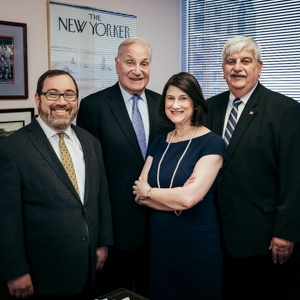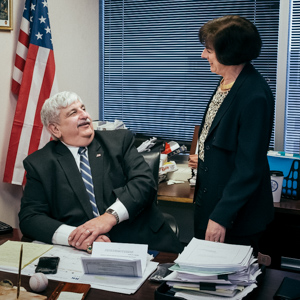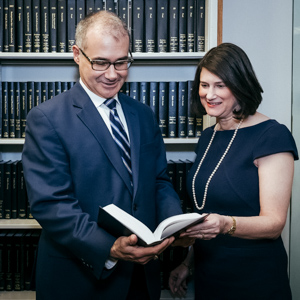Representative Matters
Matter of Merestead, 188 A.D.3d 690 (2d Dep’t 2020)

Appellate Practice – Municipal Law & Land Use – Trusts and Estates – Motion to Intervene
McCarthy Fingar represents a diverse collection of clients, including municipal and governmental entities. Here, McCarthy Fingar’s interdisciplinary team of litigators, which included James K. Landau, Edward P. Borrelli and Frank W. Streng, succeeded in defeating an attempt by a neighboring landowner to intervene and obtained a dismissal of a petition filed by the firm on behalf of its client, the County of Westchester. By the petition, the County seeks to modify or extinguish certain restrictions on the use of Merestead, 130 acres of property donated to the County so that Merestead can better carry out the original intentions of the family that donated the property for various uses, including as a park. The Supreme Court, Westchester County, denied the neighboring landowner’s motion, and the landowner appealed to the Appellate Division, Second Department. The Second Department unanimously affirmed the decision of the motion court, agreeing that the motion to intervene was fatally defective because the neighboring landowner did not submit a proposed pleading with their motion. The Second Department also agreed with the motion court’s decision denying the motion without leave to renew on proper papers “since the proposed intervenors failed to show a real and substantial interest in the outcome of the proceeding.”
[Read in full]AAA Carting and Rubbish Removal, Inc. v. Village of Pelham, ___ Misc. 3d ___ (Sup. Ct., Westchester 2020)
Clinton B. Smith, Lester D. Steinman


Municipal Law & Land Use – Article 78 Proceedings – Unsuccessful Bidders
McCarthy Fingar’s municipal attorneys often defend their municipal clients against Article 78 proceedings brought by private individuals and companies. Article 78 of the Civil Practice Law and Rules is frequently used to challenge decisions made by municipalities when a private party feels aggrieved by a decision made by a governmental entity. Here, James K. Landau, Clinton Smith and Lester Steinman obtained the dismissal of just such a proceeding against the Village of Pelham, commenced by an unsuccessful bidder for a garbage hauling contract who was found by the Village not to be a responsible bidder under the General Municipal Law. In dismissing the petition, the Supreme Court, Westchester County, determined that the Village had demonstrated 7 different ways that it rationally determined the unsuccessful bidder to not be responsible.
[Read in full]Mitarotonda v. Mitarotonda, ___ A.D.3d ___ (2d Dep’t 2019)

Matrimonial & Family Law – Child Custody – Appellate Practice – Constructive Emancipation
Our matrimonial lawyers often represent clients on financial issues relating to child custody. Here, Kristen Pennessi & Kathleen Donelli won an appeal in the Appellate Division in which the lower court denied a post-divorce judgment motion, brought by the noncustodial parent (the “father”), to stop paying the custodial parent (our client, the “mother”) child support based on constructive emancipation. Under the doctrine of constructive emancipation, New York courts have held that child support payments may be suspended where the “custodial parent unjustifiably frustrates the noncustodial parent’s right of reasonable access.” Kristen and Kathleen successfully argued that our client, the custodial parent, did not deliberately frustrate or actively interfere with the father’s relationship with his children. Therefore, the court ordered that the father continue to pay child support even though his children refused to have meaningful contact with him.
[Read in full]In the Matter of the Application of AVC Properties LLC v. The Village of Mamaroneck Zoning Board of Appeals, et al. (Sup. Ct. Westchester, Index Nos. 59146 and 62808/2018)

Municipal Law & Land Use – Article 78 Proceedings – Zoning Board of Appeals
McCarthy Fingar’s Municipal Law & Land Use lawyers are often defending decisions made by our municipal clients. Here, James K. Landau and Lori Lee Dickson successfully obtained the dismissal of two Article 78 petitions brought by AVC Properties, a landowner and developer who sought to appeal from resolutions issued by against firm client Village of Mamaroneck Zoning Board of Appeals (the “ZBA”). The Court agreed with ZBA’s argument that challenges to its resolutions were not ripe for judicial review because the resolutions were not final and any claimed harm by the landowner may be prevented, ameliorated or rendered moot by further steps available to petitioner and further administrative action.
[Read in full]Matter of Argondizza, 168 A.D.3d 426 (1st Dep’t 2019)

Surrogate’s Court Litigation – Property Turnover Proceedings – Transfer of Co-op Apartment – Power of Attorney
Transfers of assets using a power of attorney often lead to conflict. The question is whether the transfer by the agent under the power of attorney was in the best interests of the principal. In Matter of Argondizza, 168 A.D.3d 426 (1st Dep’t 2019), Michael S. Kutzin succeeded in having the Appellate Division uphold the Surrogate’s Court in dismissing the claim brought by two children in a property turnover proceeding against their stepfather. Here, the Surrogate’s Court rejected the argument that the stepfather breached his fiduciary duties when, as an agent under a power of attorney, he transferred a co-op he co-owned with his wife into his own name. In this case, the decedent had told her treating physician that it was her desire that the co-op be transferred into her husband’s name, the transfer was being done in order to obtain eligibility for Medicaid coverage of long term care, and the children were aware of and took part in the transfers.
[Read in full]Matter of Francine Wechsler, Surr. Ct., Rockland (File No. 2013-225/G/H) (2-1-2019)
Irma K. Nimetz, Frank W. Streng


Surrogate’s Court Litigation – Trusts & Estates – Will Contest – Construction Proceeding
McCarthy Fingar’s Surrogate’s Court litigators sometimes represent clients in will construction proceedings, sometimes involving the issue of ademption. In Matter of Wechsler, Frank W. Streng and Irma K. Nimetz represented a sister and brother in a will construction proceeding in Surrogate’s Court, Rockland County, against three of their siblings concerning a provision in their mother’s will with respect to two New York City taxi medallions, which their mother distributed unequally amongst her 13 surviving children and 40 grandchildren. Despite the inclusion of the taxi medallions in her will, the mother sold both taxi medallions during her lifetime. The net proceeds of the sale of the taxi medallions were held in a joint bank account in the name of the mother and one of her daughters. Frank and Irma successfully argued that the lifetime sale of the taxi medallions caused an ademption of the mother’s specific bequest of the taxi medallions. Ademption occurs when a specific bequest, here, the taxi medallions, does not exist at the time of the testator’s death because it was sold, lost or destroyed. Because the mother’s will did not address the possibility of a sale of the taxi medallions before she died, Frank and Irma argued that the bequest of the taxi medallions adeemed, and the proceeds of the sale should be distributed in equal shares to the mother’s children under the residuary clause of her will. The Surrogate’s Court ruled that Frank and Irma, on behalf of their clients, established that the law of ademption applied, and granted summary judgment in favor of the firm’s clients ruling that the bequest of the taxi medallions adeemed. The court also rejected the argument that one of McCarthy Fingar’s clients exercised undue influence to cause the sale of the medallions prior to the decedent’s death.
[Read in full]Probate Proceeding, Will of Francesca Morris, Surr. Ct., Dutchess (File No. 2019-240) (10-28-19)
Irma K. Nimetz, Frank W. Streng


Surrogate’s Court Litigation – Trusts & Estates – Will Contest – Will Not Signed at End
McCarthy Fingar’s lawyers represent clients in all types of will contests, including cases in which a will not signed at the end was offered for probate. In Matter of Francesca Morris, two of our Surrogate’s Court litigators, Frank W. Streng and Irma K. Nimetz, represented a deceased father’s three adult children, who challenged a propounded instrument purporting to be the last will & testament of Francesca Morris, their grandmother. Francesca Morris had two children, a son who predeceased his mother and was survived by our clients, and a daughter, the aunt of our clients. The aunt filed an amended probate petition seeking to probate a propounded instrument pursuant to which the decedent/her mother bequeathed her entire estate to her daughter. Under a prior will, the decedent bequeathed her estate equally between her daughter and her son. Frank and Irma made a motion to dismiss the amended probate petition on the grounds that the propounded instrument was not executed in accordance with the strict statutory formalities required by the law, specifically New York’s Estates, Powers and Trusts Law (“EPTL”) § 3-2.1(a)(1). Frank and Irma argued that the testator, Francesca Morris, never signed the purported will “at the end of thereof” as required by law. Instead, at the will execution, which was not supervised by an attorney, a notary public signed the purported will where the testator was supposed to sign. As Frank and Irma asserted in their motion to dismiss, the testator only placed her initials on a self proving affidavit, which is not an integral part of the propounded instrument. The Court agreed with Frank and Irma, and denied probate. The Court ruled that the decedent’s initials, appearing solely on the self proving affidavit, did not constitute a signature “at the end” of the propounded instrument and failed to satisfy the statutory requirements of EPTL § 3-2.1 as a matter of law. The Court granted Frank and Irma’s motion to dismiss the amended probate petition pursuant to CPLR Rule 3211 (a) (1) and (7).
[Read in full]Probate Proceeding, Will of Elinor Haight, Surr. Ct., Westchester (File No. 2019-148/C) (2-28-19)
Irma K. Nimetz, Frank W. Streng


Surrogate’s Court Litigation – Trusts & Estates – Will Contests – Award of Preliminary Letters Testamentary
As part of our firm’s representation of clients in will contests, battles sometimes take place on applications for preliminary letters testamentary at the inception of the probate proceeding, that determines who shall administer the estate during the will contest. In Matter of Elinor J. Haight, Frank W. Streng and Irma K. Nimetz represented the sole nominated executor under her deceased mother’s codicil, dated March 10, 2015, and will, dated February 13, 2002. Both the codicil and the will were drafted by attorneys, who supervised the execution of the instruments. Our client’s mother named her daughter, as the sole executor in her 2015 codicil. In her earlier will, the mother nominated her daughter and her two sons, our client’s brothers, as co-executors. Frank and Irma filed an application for preliminary letters testamentary on behalf of their client in a contested probate proceeding. The two brothers opposed our client’s application for preliminary letters and asked the Court to deny our client’s application entirely, or to appoint one or both of them to serve as co-preliminary executor(s) arguing, among other things, that the codicil was procured by undue influence, duress and fraud. Frank and Irma argued that the Court should issue preliminary letters to their client pursuant to the well settled law under SCPA § 1412(2)(a), and reject the brothers’ unsubstantiated and conclusory allegations. Frank and Irma pointed out that by awarding preliminary letters to their client, the sole nominated executor, the Court would be honoring the testator’s preference in choosing the fiduciary and would enable the estate to be immediately administered since there may be a delay in probate. The Court agreed and awarded preliminary letters testamentary to the sole nominated executor, the firm’s client.
[Read in full]Krowe v. Todd, AAA Case No. 01-18-0000-4009

Commercial Litigation – Arbitration/Mediation
Our Commercial Litigation lawyers represent clients in arbitration before the American Arbitration Association. James K. Landau and Irma K. Nimetz successfully represented a business owner in a dispute with the other member of a closely held limited liability company. Here, our client commenced an arbitration through the American Arbitration Association seeking damages on theories of breach of contract, breach of fiduciary duty, breach of the covenant of good faith and fair dealing and seeking an accounting and the imposition of a constructive trust based on certain alleged unauthorized use of company funds by the respondent. After the respondent interposed counterclaims and moved for summary judgment, a settlement favorable to our client was obtained in mediation.
Probate Proceedings – Complicated Uncontested Will

Trusts & Estates– Probate Proceedings – Complicated Uncontested Will
Not all probate proceedings are created equal. In 2018, after taking over from prior counsel, Michael S. Kutzin succeeded in having a will admitted to probate that clerks in the New York County Surrogate’s Court referred to as one of the most complex uncontested matters that they had seen. In that case, the decedent, who was unmarried and had no children, had filed a prior will in the court which had a series of unusual provisions, including a trust for the benefit of first cousins once removed living in Ireland and England. She also had a large extended family in the United States and abroad. To complicate matters further, numerous beneficiaries and interested parties died after the decedent did but before the will was admitted to probate, making the probate particularly difficult. Nevertheless, through hard work and determination, Michael succeeded in having the will admitted to probate.



